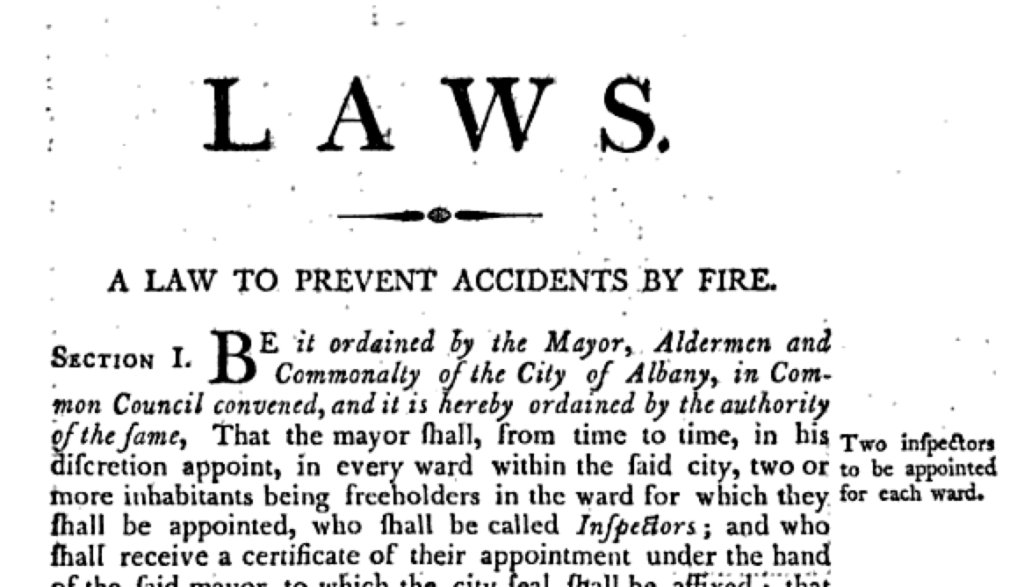
In 1800, the Charter of the City of Albany and the Laws and Ordinances, Ordained and Established the bye Mayor, Aldermen and Commonality of said City were published. First in the section of laws was “A Law to Prevent Accidents by Fire,” which was an elaborate set of rules aimed at preventing one of the most dangerous scourges of the 18th century.
First it provided that the mayor could appoint in every ward two freeholders “who shall be called Inspectors,” and that “if any person appointed an inspector, shall neglect to take upon him the execution of the duties of the said office, he shall forfeit the sum of five dollars.” The job of the inspectors was to, at least once in every two weeks, carefully examine and inspect all “chimnies, hearths, stoves, stove-pipes, ash-houses, and other places in which fire or ashes shall be kept, within any part of the ward for which they shall be appointed.” If they found that any chimney needed cleansing, repairing or securing, or that any hearth, stove, stove-pipe, or ash-house was dangerous or not properly secured, they could give notice that it be fixed within two days. There was also the task of inspecting the leather buckets required by law (to be used for carrying water in the event of fire); the inspectors were to check every two weeks whether “the several persons enjoined to furnish leather buckets are possessed of the requisite number – and whether the same are in good order.”
The law also required that every stovepipe through any wooden floor, roof, or partition be at least an inch and a half distant from the wood, and that it should be “conducted into a chimney, wherever it can be done without great inconvenience.”
If your chimney were to “take fire and burn for want of cleaning or properly securing the same,” you would be fined $2.50 for each occurrence, but the inspectors would be punished too, forfeiting sixty-two cents and five mills, and an additional $1.25 for failing to perform any of their other duties. (Imagine if inspectors shared in the penalties today.)
There was a strict requirement that every house with two or more fireplaces keep leather buckets in good order and repair. For two fireplaces, you were required to have one bucket; for four, two; for five, three, for six, five buckets; and for every house having more than six fireplaces, five buckets for the first six fireplaces and one bucket for every fireplace more than six. Regardless of the number, the buckets “shall be marked at least with the initial letters of the owner’s name and sirname [sic]; that if such buckets shall be provided by any tenant or tenants, it shall be at the expence [sic] of his, her or their landlord or landlords; and that if any owner or tenant as aforesaid, shall neglect or refuse to procure or keep in good order and repair the leather buckets which he or she shall in and by this law be required to furnish, such owner or Tenant shall forfeit and pay the sum of seventy-five cents for every bucket deficient . . . and the further sum of 37 cents 5 mills for every ten days such bucket shall remain deficient or not in good order and repair as aforesaid…”
This one goes out to everyone who thinks that wildly detailed bureaucracy and laws are something new, and to those who say that gender-inclusive language is just a sign of political correctness.

Leave a Reply